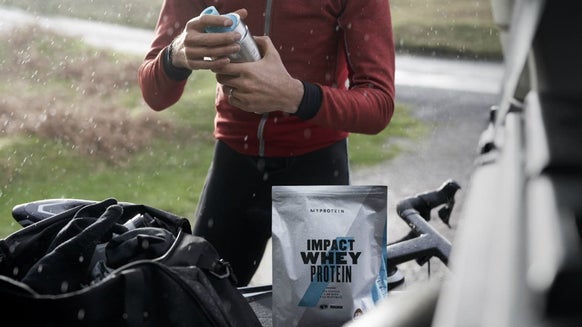Your Metabolism Isn’t “Broken”

The diet industry is riddled with the classic sales approach of “we have a solution to the problem you didn’t know you had until we told you about it”.
One of the most egregious fibs dieting “experts” will tell you is that your metabolism is in some way “broken” or “confused”.
If our metabolism ever became confused or broken, weight loss would be the least of your worries. In fact, you probably wouldn’t have any worries because you wouldn’t be here any longer…
But what exactly is our metabolism?

Metabolism and you
Human metabolism isn’t simply how we manage our weight but it encapsulates all of the chemical reactions that occur within our body.1
These chemical reactions are continually ongoing and are responsible for energy production, repairs, respiration and removing harmful waste products.
Your metabolism isn’t simply one thing — it’s an umbrella term for a countless number of things all occurring continually.
It’s kind of like the immune system; we see it as this singular system (maybe because that’s easier to visualise) when, in reality, it’s a complex mish mash of many organs and other components of our body all working in synergy and in a state of continual flux to keep you protected.
Your metabolism, much like immune system, is also constantly changing.
For instance, when you eat your metabolism increases. Why? Well, to break down the foods and utilise the nutrients that have just entered the system.
Want to know something else cool about your metabolism? We’re constantly storing and breaking down stored nutrients. Fat for example — we’re always breaking down fat somewhere in the body whereas in other places we could be storing it.
Significant weight or fat loss occurs when this turnover is in favour of fat being broken down and used for fuel as opposed to being stored.2
This is most readily achieved by sustaining a calorie deficit, but what we eat and the activity we perform also play an important part.
Metabolism doesn’t break… but it does change
Hopefully by now you understand that “metabolic damage” or “confusion” or even a “broken metabolism” are buzz words for salesy types and not what’s actually happening within our body.
“But why is it that when I’m in a calorie deficit I’m not losing weight like I’d expect?!”
Well, there are quite a few reasons for that actually…
Metabolism won’t break or get confused but it does change. It can speed up, slow down, and adapt to the nutrient intake you’re providing.
There are a number of reasons why your metabolism may speed up:
Eating more food than usual.3 Eating a diet which is higher in protein (protein has the greatest thermic effect meaning, quite simply, the energy it costs for us to digest and use food that we’ve eaten).4 Having a greater amount of lean muscle mass.5 Changes in hormonal profile (for instance, women’s base metabolic rate increases during menstruation).6 If you exercise (certain types of training, such as weight training, have been shown to elevate metabolic rate long after the activity is finished).7,8 If you consume certain dietary components (the likes of caffeine and capsaicin for example elevate energy expenditure).9,10
If the goal is weight or fat loss (which may not always be the same thing bear in mind; you can lose weight without it necessarily being fat) then incorporating these strategies (within a calorie deficit framework) would be advised.
Ultimately, the goal should be to retain as much lean muscle mass, maintaining exercise performance as best you can as well as eating as much as possible whilst achieving weight or fat loss.
This is how you keep your metabolism on your side whilst achieving that ideal muscular, lean physique.
On the other hand, there are a number of reasons why your metabolism may slow down, and this is really where a lot of that frustration around dieting comes from:
You’re not eating enough (albeit, you can still lose weight, this doesn’t “shut off” when you reach a certain energy intake threshold it just becomes harder to achieve a deficit thanks to adaptation).11 You’re expending less energy (either through less programmed physical activity or your non-exercise activity which can account for up to 1000kcals of energy expended per day!)12 Your diet doesn’t contain enough protein
You’re losing lean muscle mass from malnourishment and inadequate exercise
This myriad of mind numbingly frustrating hurdles to achieve that weight loss you’re aiming for is coined “adaptive thermogenesis”.13
This essentially encapsulates the behavioural, hormonal, metabolic, and autonomic (your autonomic nervous system is responsible for regulating involuntary body functions, such as heartbeat, blood flow, breathing, and digestion) changes that accompany weight change.
To put it bluntly, your metabolism hasn’t broken or become confused, your body is simply “fighting back” against the weight loss you’re aiming to achieve.

So, what can we do to fight back against the fight back?
Roll over and play dead?
Absolutely not. In fact, there’s plenty that you can do to override your physiological response and push through these plateaus and achieved successful and sustained weight loss.
So, what can we do to actually achieve successful, sustained weight loss?
Eating as much as you can whilst losing weight Eating a diet higher in protein (“actual experts” suggest somewhere between 1.2 to 1.6g per kg of bodyweight per day)14 Continue to exercise and perform intense exercise several times a week Consider incorporating the likes of caffeine into your diet.
Well, that’s great for keeping your energy expenditure firing on all cylinders, but what else do we have to do to achieve sustained long term weight loss?
A group of researchers drew up a large-scale study incorporating over 70 papers which laid out what they discovered were the keys to successful and sustained weight loss.15
Portion control A reduction in total food energy intake A higher dietary protein intake (told you so!) A lower dietary fat intake (not to say dietary fat is “bad” but it is the densest of the macronutrient groups lauding in at around 9kcals per gram) An increase in plant-based foods (fruit and vegetable intake) Less calories consumed from sugar-sweetened beverages An inclusive rather than exclusive approach to food choice (food flexibility which, recently, has been shown to be as good during a diet, compared to super rigid dieting, as well as much better for after!)16
They also found that those who tracked their weight, monitored their eating and maintained an active lifestyle were found to be generally more successful than those who didn’t.
One other strategy to avoiding any unwanted metabolic slowdown is planning in “diet breaks”.
A funky study called the MATADOR study (I’m not fibbing, it stands for Minimising Adaptive Thermogenesis and Deactivating Obesity Rebound) trialled these diet breaks between two groups of weight loss enthusiasts.17
One group was asked to follow a continuous calorie restriction diet whereas the other was assigned to 2 weeks on, 2 weeks off, alternating calorie restriction and eating at maintenance.
All in all, the study was fairly lengthy (around 30 weeks of actual dieting) and yielded some interesting findings!
The researchers found that it was those following the intermittent dieting format who achieved greater weight and fat loss. The researchers believe this was because the diet breaks reduced the impact of adaptive thermogenesis (and that this approach is actually much more sustainable too).
Take home message
Metabolism doesn’t break.
Nor does it get confused.
If that actually happened, you’d be not alive enough to care all that much about a few pounds on the scale.
Our metabolism can change however, especially when we’re trying to lose weight.
Adaptations to the size of our body, our body composition, the energy intake we have available and the make up of our diet all play a factor in our metabolism and whether it speeds up, goes down or stays the same.

- de Nava, A. S. L., & Raja, A. (2020).Physiology, Metabolism. StatPearls [Internet].
- Dokken, B. B., & Tsao, T. S. (2007).The physiology of body weight regulation: are we too efficient for our own good?. Diabetes Spectrum, 20(3), 166-170.
- Poehlman, E. T., & Horton, E. S. (1989).The impact of food intake and exercise on energy expenditure. Nutrition reviews, 47(5), 129-137.
- Pesta, D. H., & Samuel, V. T. (2014).A high-protein diet for reducing body fat: mechanisms and possible caveats. Nutrition & metabolism, 11(1), 1-8.
- McMurray, R. G., Soares, J., Caspersen, C. J., & McCurdy, T. (2014).Examining variations of resting metabolic rate of adults: a public health perspective. Medicine and science in sports and exercise, 46(7), 1352.
- Benton, M. J., Hutchins, A. M., & Dawes, J. J. (2020).Effect of menstrual cycle on resting metabolism: A systematic review and meta-analysis. PloS one, 15(7), e0236025.
- Poehlman, E. T., & Horton, E. S. (1989).The impact of food intake and exercise on energy expenditure. Nutrition reviews, 47(5), 129-137.
- Aristizabal, J. C.,Freidenreich, D. J., Volk, B. M., Kupchak, B. R., Saenz, C., Maresh, C. M., … & Volek, J. S. (2015). Effect of resistance training on resting metabolic rate and its estimation by a dual-energy X-ray absorptiometry metabolic map. European journal of clinical nutrition, 69(7), 831-836.
- Koot, P., &Deurenberg, P. (1995). Comparison of changes in energy expenditure and body temperatures after caffeine consumption. Annals of Nutrition and Metabolism, 39(3), 135-142.
- Koot, P., &Deurenberg, P. (1995). Comparison of changes in energy expenditure and body temperatures after caffeine consumption. Annals of Nutrition and Metabolism, 39(3), 135-142.
- Müller, M. J., Enderle, J.,Pourhassan, M., Braun, W., Eggeling, B., Lagerpusch, M., … & Bosy-Westphal, A. (2015). Metabolic adaptation to caloric restriction and subsequent refeeding: the Minnesota Starvation Experiment revisited. The American journal of clinical nutrition, 102(4), 807-819.
- von Loeffelholz, C., & Birkenfeld, A. (2018).The role of non-exercise activity thermogenesis in human obesity. Endotext [Internet].
- Rosenbaum, M., & Leibel, R. L. (2010).Adaptive thermogenesis in humans. International journal of obesity, 34(1), S47-S55.
- Leidy, H. J., Clifton, P. M., Astrup, A., Wycherley, T. P.,Westerterp-Plantenga, M. S., Luscombe-Marsh, N. D., … & Mattes, R. D. (2015). The role of protein in weight loss and maintenance. The American journal of clinical nutrition, 101(6), 1320S-1329S.
- Varkevisser, R. D. M., VanStralen, M. M., Kroeze, W., Ket, J. C. F., & Steenhuis, I. H. M. (2019). Determinants of weight loss maintenance: a systematic review. Obesity reviews, 20(2), 171-211.
- Conlin, L. A., Aguilar, D. T., Rogers, G. E., & Campbell, B. I. (2021).Flexible vs. rigid dieting in resistance-trained individuals seeking to optimize their physiques: A randomized controlled trial. Journal of the International Society of Sports Nutrition, 18(1), 1-10.
- Byrne, N. M., Sainsbury, A., King, N. A., Hills, A. P., & Wood, R. E. (2018).Intermittent energy restriction improves weight loss efficiency in obese men: the MATADOR study. International journal of obesity, 42(2), 129-138.






